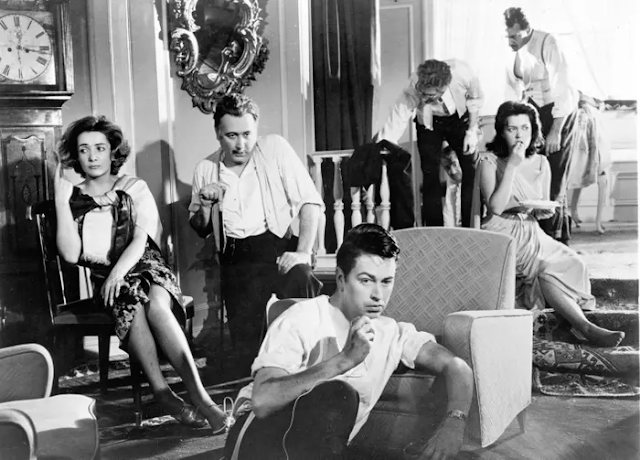The Exterminating Angel (1962)
Luis Bunuel's "The Exterminating Angel"
All throughout his work, Luis Bunuel has used film to exploit the hypocrisy of the social elite. His 1962 Mexican film "The Exterminating Angel" is no different. As always, this Bunuel work comes with a certain dose of surrealism. The surrealism used in this scenario acts as a plot device to allow the central theme of the film to come into focus.
In the film, a group of wealthy dinner guests find that they are unable to leave a dinner party after its conclusion. Every attempt at leaving the salon fails, as many of the guests stand in the doorway of the salon but are unable to pass through. Eventually, the dinner party descends into mayhem, as various members begin to sleep with each other, assign blame, become fatigued, become irrational, and above all, begin to behave dramatically and animalistic. It become clear that the point of the film is to eradicate the respectability of the bourgeois class. Basically, Bunuel takes a group of haute bourgeoise and demonstrates to them the fallibility in their etiquette, pretensions, and superiority complex by forcing them into a "Lord of the Flies" type situation. Film critic Roger Ebert perhaps wrote the best analysis for the film in saying, "The dinner guests represent the ruling class in Franco's Spain. Having set a banquet table for themselves by defeating the workers in the Spanish Civil War, they sit down for a feast, only to find it never ends. They're trapped in their own bourgeois cul-de-sac. Increasingly resentful at being shut off from the world outside, they grow mean and restless; their worst tendencies are revealed." Of course, a Bunuel film wouldn't be complete without also criticizing the Catholic Church. At the end of the film, Bunuel teases a similar fate to those trying to leave mass in the final scene. Bunuel is essentially ending the film on the note that he can "Lord of the Flies" the pretenders of the Catholic Church as well and establish the same result that underneath their pomp and circumstance lies nothing but savagery and inhospitality.
"The Exterminating Angel" holds a relatively simple premise under the circumstances of absurdity. Because of this engineered plot device, the film has been said to be a great influence on the horror genre. Many critics have noted the parallel between "The Exterminating Angel" and contemporary horror films that use supernatural (absurdist) plot structures to turn its protagonists into their most amoral or depraved versions of themselves. Typically, this is done to haute or bourgeoise characters, just as in "The Exterminating Angel." Despite its parallels to modern horror films, Luis Bunuel's artistic takedown of the Spanish ruling class remains a classic film of his oeuvre and of Mexican cinema.




Comments
Post a Comment